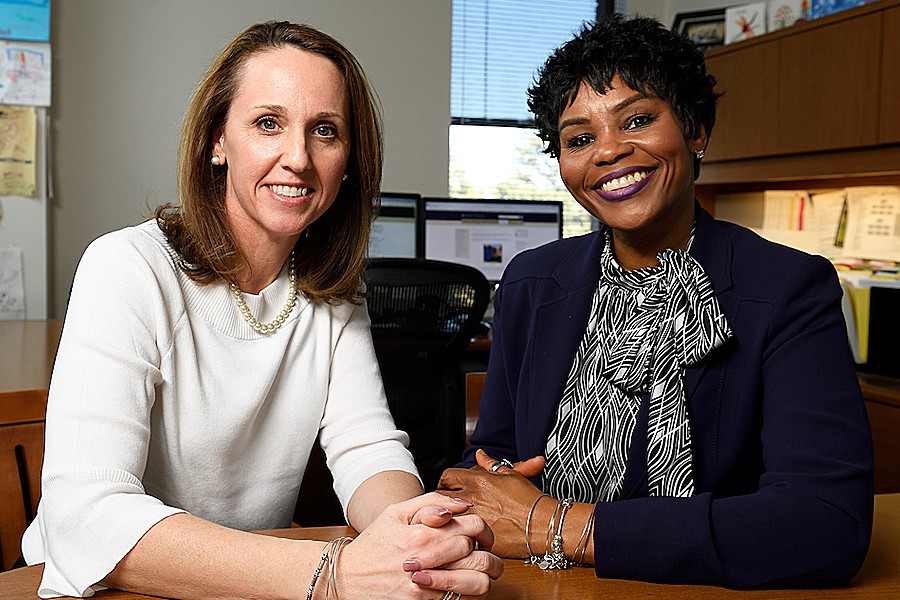When it comes to professional growth, there's nothing like sharing knowledge and experience with a colleague through a mentorship. To help enrich the professional development of staff in finance roles throughout the university, senior leaders in finance and administration partnered with the Office of Talent Management in 2016 to develop the Finance Diversity Mentorship Program.
In addition to one-on-one mentoring, the 10-month program includes group team-building and educational events, networking with a diverse group of individuals from across the university, and the opportunity to connect with and learn from the department's senior leaders.
Applications for the third cohort of the Finance Diversity Mentorship Program are now open on the program's website and run through the end of March.
"The program is designed to help emerging finance professionals get exposure in other areas of finance or to deepen their current experiences with someone who is in a mentorship role," says Heather Mason, manager of Organization Development and Effectiveness and one of the program's coordinators. While it originated in the central office of finance, the program's scope has grown with each new class. "This year, it's open to any university employee in a finance role," Mason adds.
The idea for the program grew from discussions between University Finance and the Black Faculty and Staff Association about the desire to increase diversity within the department, says Nicole Smith, one of the program's coordinators and an accounting manager of Contributions and Investments, who served as a mentor in the second cohort.
The initiative aligns with the JHU Roadmap on Diversity and Inclusion, which was established in 2016 and gives a comprehensive overview of the university's commitment to promoting diversity, inclusion, and equity. "A rich diversity of people, background, experience, and thought is central to our work; to our missions of education, research, and service; and to our commitment to freedom of inquiry and expression," says university President Ronald J. Daniels in the introduction to the diversity roadmap document.
In that same vein, opening the mentorship to any staff member serving in a finance role widens the scope of knowledge sharing and professional development the program offers. It's something Rhonda Lingham, cash accounting lead in the Treasury Office and a mentee in the program's second cohort, personally experienced. "On a day-to-day basis, you're often only talking to people in your department," Lingham says. "With this program, you're being opened up to individuals across the university."
When she joined Hopkins in 2016, Lingham came from a long accounting career in the construction industry and saw the program as an opportunity to deepen her institutional knowledge of the university. The close personal relationship that she would develop with her mentor, Julia Buick, director of Tax, was an unexpected bonus.
"I knew my goals, but I didn't always know how to get there or what to do," Lingham explains. "Julia was my voice of reason, my sounding board. Once I got to know her, we just had so much in common—even in our personal life, family, kids, things like that."
The program also offers networking and opportunities to meet senior leadership-last year's cohort was invited to a breakfast with Daniel Ennis, senior vice president for finance and administration.
"In this process I felt important because I had my treasury manager, Oprah Moore, and two senior leaders rooting for me," says Lingham of her mentor, Buick, and deputy treasurer Priscilla Hoblitzell, who recommended she apply to the program. "Sometimes when you get in a big organization like this, you could get lost. It made me feel like an important asset to the company, that [leadership was] taking the time to develop what I wanted. They were really interested in what I wanted to do."
For Buick, who came to the university five years ago, being a mentor is an important part of professional development carried over from her prior role at a public accounting firm, where she was both a mentee and mentor. "I got a lot out of being mentored and mentoring others because you're growing in both roles, always," she says.
Buick and Lingham found it most effective to plan all their meetings for the duration of the program in advance, working around their departments' busy seasons and using lunch breaks to explore a shared interest: dining out at local restaurants. "It's important to learn to fold it into your time at work," says Buick of the time commitment. "The lunches are something we looked forward to."
Although the program officially ended in the fall, the pair has continued their friendship, regularly keeping in contact and meeting up for lunches. "I'd love to see Rhonda become a mentor—I think she's got great skills for that," says Buick. "I would absolutely do [the program] again. I just think it's an important part of professional life."
Those interested in applying as a mentor or mentee can find more information and apply online. If you know someone in finance who you think would make a great mentor or mentee, you're encouraged to suggest they apply.
Posted in News+Info, Benefits+Perks, Tools+Tech








